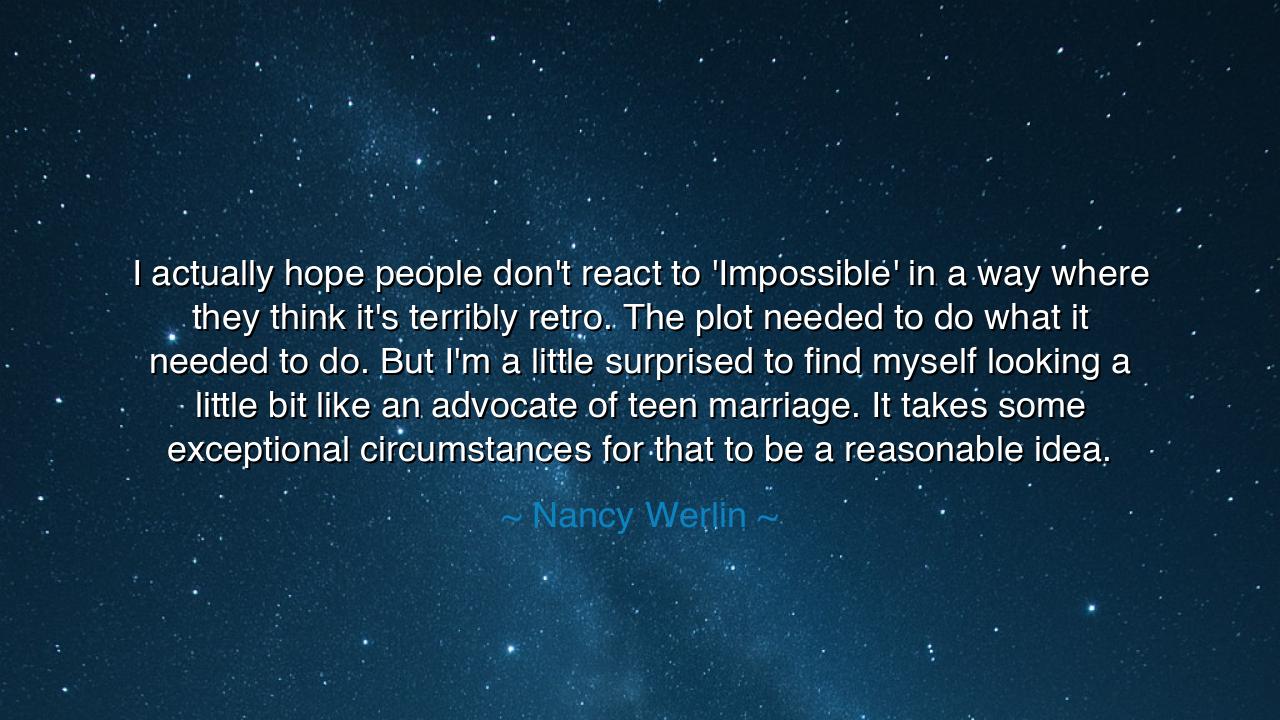
I actually hope people don't react to 'Impossible' in a way
I actually hope people don't react to 'Impossible' in a way where they think it's terribly retro. The plot needed to do what it needed to do. But I'm a little surprised to find myself looking a little bit like an advocate of teen marriage. It takes some exceptional circumstances for that to be a reasonable idea.






Hearken, O children of the ages, to the reflective words of Nancy Werlin, who speaks with the wisdom of both craft and conscience: “I actually hope people don’t react to Impossible in a way where they think it’s terribly retro. The plot needed to do what it needed to do. But I’m a little surprised to find myself looking a little bit like an advocate of teen marriage. It takes some exceptional circumstances for that to be a reasonable idea.” In her insight, we perceive a timeless tension between storytelling and morality, between the imaginative necessity of plot and the ethical lens through which society interprets it.
Since the dawn of human narrative, storytellers have wrestled with similar challenges. In the epics of Homer, young heroes faced trials, dangers, and alliances that, when viewed through contemporary eyes, might seem foreign or even questionable. Yet these plots were dictated by the necessities of story, the demands of dramatic tension, and the lessons the narrative sought to convey. Werlin’s reflection mirrors this ancient principle: storytelling is a craft that requires balance, intention, and the recognition that narrative choices carry weight and interpretation.
Consider the story of Sophocles, whose tragedies often placed young characters in extraordinary circumstances, where their choices reflected both societal pressures and personal growth. The audience, observing from a distance of time and experience, might judge the actions differently than contemporaries did. Similarly, Werlin’s acknowledgment of the perception of teen marriage in Impossible highlights the gap between narrative necessity and social expectation, reminding us that stories are received through the lens of current moral and cultural values.
Werlin’s reflection also illuminates the complexity of adolescent experience. Teens, in fiction and in life, encounter situations of heightened emotion, confusion, and responsibility. In crafting Impossible, she sought to portray choices that, while extreme, were grounded in the realities of the narrative world. Ancient writers, too, recognized that the experiences of youth are intense and consequential, and that stories must reflect the exceptional circumstances in which character and wisdom are forged.
The lesson is profound: storytellers bear responsibility for the way their narratives are interpreted, even as they pursue artistic necessity. Werlin teaches that the depiction of extraordinary situations—such as teen marriage in fiction—requires careful context and awareness, ensuring that readers understand the exceptional nature of the circumstances rather than perceiving them as general prescription. Moral discernment, both in creation and reception, is essential.
Practical guidance emerges from this reflection. When encountering narratives that depict extreme or unusual situations, consider the context and the intent behind the story. Recognize that fiction often explores the boundaries of human experience, and that the lessons are nuanced, not always literal. For creators, balance the needs of plot with the ethical implications of narrative choices, guiding the audience toward understanding rather than misinterpretation.
Werlin’s words also remind us that perception is as powerful as intention. Even when a story aims to illuminate, entertain, or challenge, audiences may interpret it through their own cultural and moral frameworks. The duty of both storyteller and reader is to engage thoughtfully, discerning between narrative necessity and normative endorsement, appreciating the lessons embedded in complexity and exceptional circumstance.
Thus, heed the eternal teaching of Nancy Werlin: stories are mirrors of human experience, shaped by necessity, imagination, and context. Yet they are also interpreted through the lens of society, morality, and expectation. Approach narrative with discernment, honor the exceptional circumstances it depicts, and recognize that fiction is both a guide and a provocation—a means to explore the human condition, ethical complexity, and the extraordinary choices that shape character and understanding.






AAdministratorAdministrator
Welcome, honored guests. Please leave a comment, we will respond soon